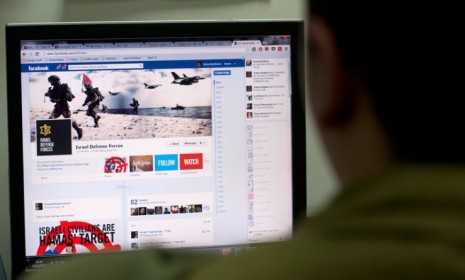Should Twitter bar Israel from live-tweeting its Gaza offensive?
Israel is launching an all-out propaganda campaign on social media that includes chilling threats against senior Hamas leaders

A free daily email with the biggest news stories of the day – and the best features from TheWeek.com
You are now subscribed
Your newsletter sign-up was successful
Twitter's terms of service state that users "may not publish or post direct, specific threats of violence against others." Yet the Israeli army, formally known as the Israeli Defense Forces, has unleashed a stream of tweets tracking its offensive against Palestinian militants in Gaza, which include what appear to be threats against senior leaders of the Islamic group Hamas.
Here's one of the most talked-about tweets:
The tweets are part of an unprecedented social media campaign to spread propaganda, allowing the IDF to circumvent an international press that is often sympathetic to Palestinian communities that have lived under occupation for decades. The IDF's tweets stress the near-constant rocket fire coming into Israel from Gaza, as well as Israeli casualties. The tweets also contain video of Israeli missiles blowing up Hamas militants, and brag about the IDF's high-tech weapons and defense systems.
The Week
Escape your echo chamber. Get the facts behind the news, plus analysis from multiple perspectives.

Sign up for The Week's Free Newsletters
From our morning news briefing to a weekly Good News Newsletter, get the best of The Week delivered directly to your inbox.
From our morning news briefing to a weekly Good News Newsletter, get the best of The Week delivered directly to your inbox.
Should Twitter allow Israel to continue to use its platform for propaganda? "In the real, human world, the implied threat behind Israel's tweets is clear — take cover, or be taken out," says Brian Fung at The Atlantic. "But nowhere is there a 'specific' threat of violence. The IDF doesn't give away any operational information. It doesn't tell Hamas, 'We're coming to get you.'"
And as distasteful as it may to be to some, many say Twitter should let the social media campaign play out. "Leaving this content up is the right call," says Matt Buchanan at BuzzFeed. "It's brutal, it's propaganda — it's war — but it's also important….Good, bad, or ugly, this shouldn't be pulled from the light of day."
However, there are serious concerns that social media could anesthetize people to the horrors of war. "By making sure the conversation takes place in this restricted forum, @IDFspokesperson is limiting the possible responses," says Joseph L. Flatley at The Verge:
When I say that the IDF has turned a military operation into a #hashtag, I'm not being cute. I'm saying that it's transformed an act of war into a social media event. And once #PillarOfDefense has become equal in our mind to #VMA2010 or #YOLO, it will be tough to evoke a stronger response than this: *grabs popcorn.* Which, if you think about it, is a victory on Israel's part.
A free daily email with the biggest news stories of the day – and the best features from TheWeek.com
-
 Currencies: Why Trump wants a weak dollar
Currencies: Why Trump wants a weak dollarFeature The dollar has fallen 12% since Trump took office
-
 Book reviews: ‘Hated by All the Right People: Tucker Carlson and the Unraveling of the Conservative Mind’ and ‘Football’
Book reviews: ‘Hated by All the Right People: Tucker Carlson and the Unraveling of the Conservative Mind’ and ‘Football’Feature A right-wing pundit’s transformations and a closer look at one of America’s favorite sports
-
 Judge blocks Trump suit for Michigan voter rolls
Judge blocks Trump suit for Michigan voter rollsSpeed Read A Trump-appointed federal judge rejected the administration’s demand for voters’ personal data